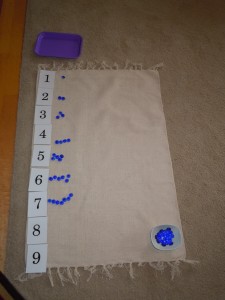Do you want to raise a kid who loves math? Here are my top tips to produce the results you’re wanting.

1. I did NOT pressure my kids to do math or to excel in math
- Instead, we played all sorts of strategic games like checkers, connect 4, chess, Pente and the like. These games build executive functioning skills like planning ahead, waiting patiently, adjusting to unexpected challenges when opponents move, and ultimately, problem solving skills. Spending time in our cerebral cortex practicing these skills in a low stakes game is much more effective, and more fun than trying to learn all of this on the fly as we move through our unpredictable lives.
2. I did not drill them or force them to memorize facts.
- Instead, I sent them to Montessori preschools, and implemented Montessori learning concepts at home. Later I helped found a public Montessori elementary charter school so that they and others could experience the beauty of a Montessori elementary program. We emphasize hands on materials for mathematical understanding. Beginning with counting and ordering objects by size in preschool and kindergarten, we move on to understanding place value, operations, fractions, time, and money work all with manipulatives for concrete understanding. Once that understanding is demonstrated through practice with the material, and then we move to more and more abstract materials and very large numbers, typically introducing the concept of one million in 2nd or 3rd grade. Students are moved to paper and pencil operations as they become proficient in the mathematical skills.
3. I did not expect them to love everything I love.
- I did imagine that my daughter would love to ride her bike, but she prefers running. I thought my son might enjoy climbing, but he loves mountain biking, and soccer. I learned quickly that wanting a child to enjoy something they don’t is a fruitless effort. Instead, I learned to follow my child’s interests, and to nurture in them their own sparks of curiosity. I certainly never expected either of them to have the love and aptitude for mathematics that they both share. My husband and I are more science nerds than math geeks, but we’ve never shied away from sharing our own scientific interests and curiosity with our kids. Now that they are 10 and 14, we can discuss topics in a new and in-depth way that allows us to see into our children’s thought processes.
4. I did not tell them how important math is.
- Instead, I showed them everyday applications for math by asking them to help me figure out how long it would take us to do all the tasks on a list or calculate how much longer until the library opened. I allowed opportunities for fun facts about math or life driven applications of math to genuinely interest me and I allowed them to join me in that interest, or not. I often spoke my own process out loud and as my children learned and grew, we could talk with each other about how we each took different mathematical routes to get to the same result. Discussing mathematical concepts that are interesting is a great way to get kids to love math.
- It was helpful that I knew that names of the Montessori math materials at school because I could say things like. “You know the multiplication bead board? I think we could use that to solve this problem. Multiplication is sets of numbers, remember?” And my kids would instantly respond, “Oh yeah! Like 4×2 is 4 twos or 2 fours.” It’s quite remarkable how much math we use in our lives. We use math for baking, accounting, construction projects, hanging art, scheduling appointments, staying within a budget, and so much more. Now my daughter loves to bake, so she loves math even more!
5. We do not have off limits topics with our kids.
- Our children are human beings that deserve respect, and not to be protected from life, or death. We are extremely fortunate to have had such little tragedy in our lives so far (our kids ACES scores are lower than ours!), but we have always had an open dialogue about everything from death and dying to sex and our reproductive systems. We talk about dark, sad and difficult things like drug addiction, war, and cancer as well as inspiring and exciting things like new projects to help reverse some of our damage to the natural world. We answer their questions and tell them the truth as we understand it when there’s not a simple answer. I think this communication style is a big part of the reason our kids still talk to us about their lives. I’m certain that having this with my own mom is the only reason I felt safe to call her to come pick me up from a high school party where there was drinking.
All of these choices have contributed to a home in which talking about academic topics is the norm at home. Yesterday I overheard my kids discussing some of their favorite novels and some of the unresolved plot lines and inconsistencies in many fictional stories, especially science fiction. The night before my kids were discussing pi and why it is an irrational number.
I hope you found this information useful in your own parenting journey!

